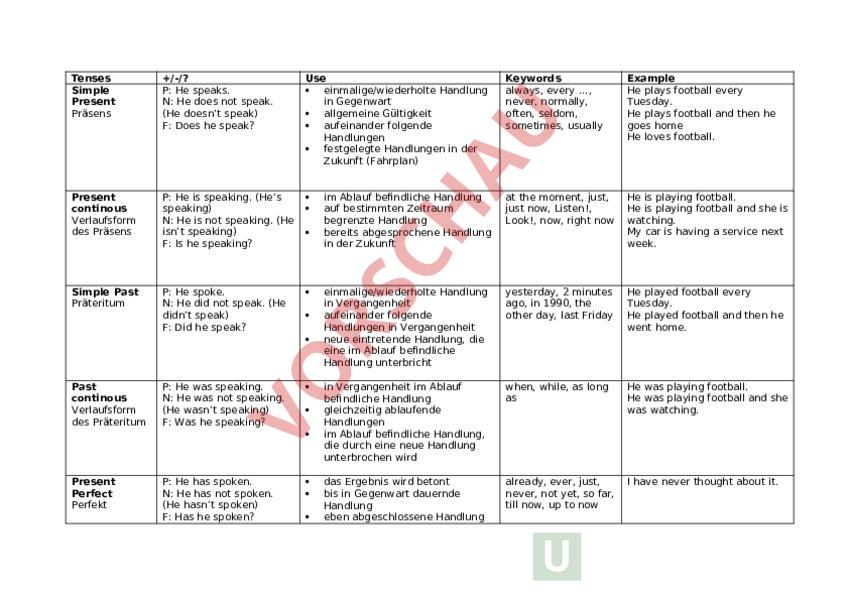Arbeitsblatt: Englisch
Material-Details
Englisch Tenses
Englisch
Grammatik
8. Schuljahr
3 Seiten
Statistik
206212
460
6
25.06.2023
Autor/in
Anita Auf der Maur
Land: Schweiz
Registriert vor 2006
Textauszüge aus dem Inhalt:
Tenses Simple Present Präsens /-/? P: He speaks. N: He does not speak. (He doesnt speak) F: Does he speak? Use einmalige/wiederholte Handlung in Gegenwart allgemeine Gültigkeit aufeinander folgende Handlungen festgelegte Handlungen in der Zukunft (Fahrplan) Present continous Verlaufsform des Präsens P: He is speaking. (Hes speaking) N: He is not speaking. (He isnt speaking) F: Is he speaking? Simple Past Präteritum P: He spoke. N: He did not speak. (He didnt speak) F: Did he speak? Past continous Verlaufsform des Präteritum P: He was speaking. N: He was not speaking. (He wasnt speaking) F: Was he speaking? Present Perfect Perfekt P: He has spoken. N: He has not spoken. (He hasnt spoken) F: Has he spoken? Keywords always, every , never, normally, often, seldom, sometimes, usually Example He plays football every Tuesday. He plays football and then he goes home He loves football. im Ablauf befindliche Handlung auf bestimmten Zeitraum begrenzte Handlung bereits abgesprochene Handlung in der Zukunft at the moment, just, just now, Listen!, Look!, now, right now He is playing football. He is playing football and she is watching. My car is having service next week. einmalige/wiederholte Handlung in Vergangenheit aufeinander folgende Handlungen in Vergangenheit neue eintretende Handlung, die eine im Ablauf befindliche Handlung unterbricht yesterday, 2 minutes ago, in 1990, the other day, last Friday He played football every Tuesday. He played football and then he went home. in Vergangenheit im Ablauf befindliche Handlung gleichzeitig ablaufende Handlungen im Ablauf befindliche Handlung, die durch eine neue Handlung unterbrochen wird when, while, as long as He was playing football. He was playing football and she was watching. das Ergebnis wird betont bis in Gegenwart dauernde Handlung eben abgeschlossene Handlung already, ever, just, never, not yet, so far, till now, up to now have never thought about it. abgeschl. Handlung mit Einfluss auf die Gegenwart Tenses Present Perfect continous Verlaufsform des Perfekt /-/? P: He has been speaking. N: He has not been speaking. (He hasnt been speaking) F: Has he been speaking? Use die Handlung wird betont (nicht das Ergebnis) bis in die Gegenwart andauernde Handlung abgeschlossene Handlung, die Einfluss auf die Gegenwart hat Keywords all day, for 4 years, since 2011, how long?, the whole week Example He has been playing football for ten years. Future (will) P: He will speak. N: He will not speak. (He wont speak) F: Will he speak? nicht beeinflussbares Geschehen in der Zukunft spontaner Entschluss Vermutungen hinsichtlich der Zukunft in year, next , tomorrow Vermutung: think, probably, perhaps He will is going to play football every Tuesday. He will play football and then he will go home. P: He is going to speak. N: He is not going to speak. (He isnt going to speak) F: Is he going to speak? P: He would speak. N: He would not speak. (He wouldnt speak) F: Would he speak? bereits bestehende Absicht hinsichtlich der Zukunft logische Schlussfolgerung hinsichtlich der Zukunft In one year, next week, tomorrow Im going to see my parents next week. Handlung, die möglicherweise eintreten könnte if-Satz Typ II (If were you, would go home.) „If were rich man . (Anatevka) Future (going to) Conditional Konjunktiv II
